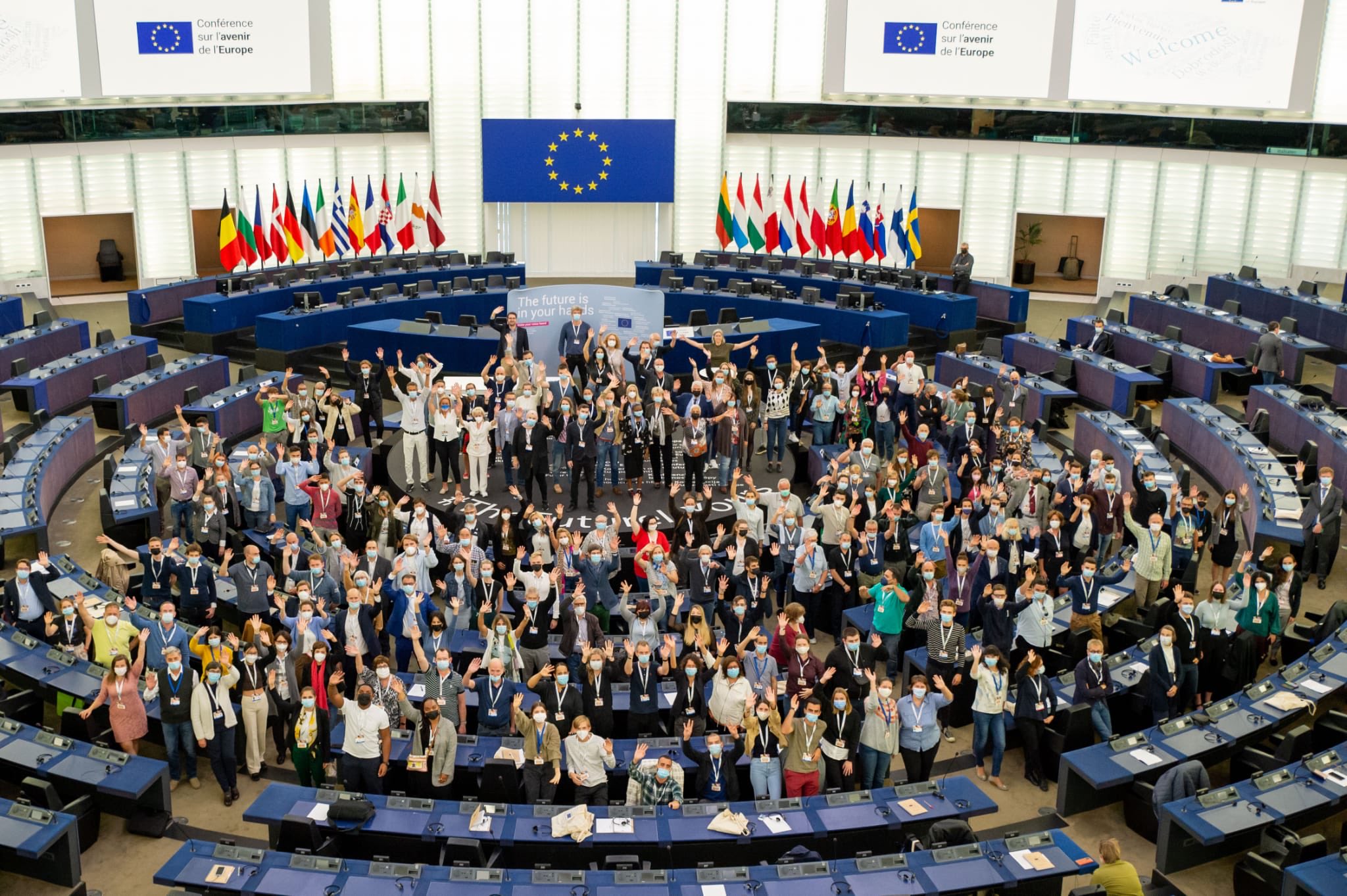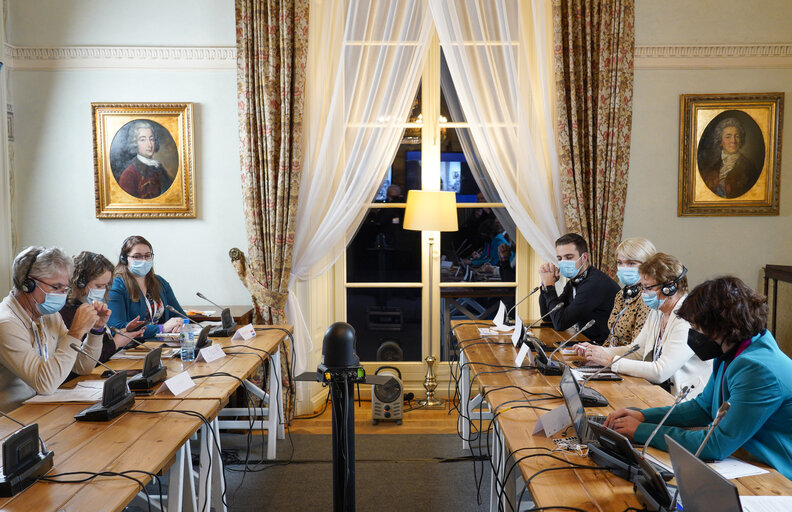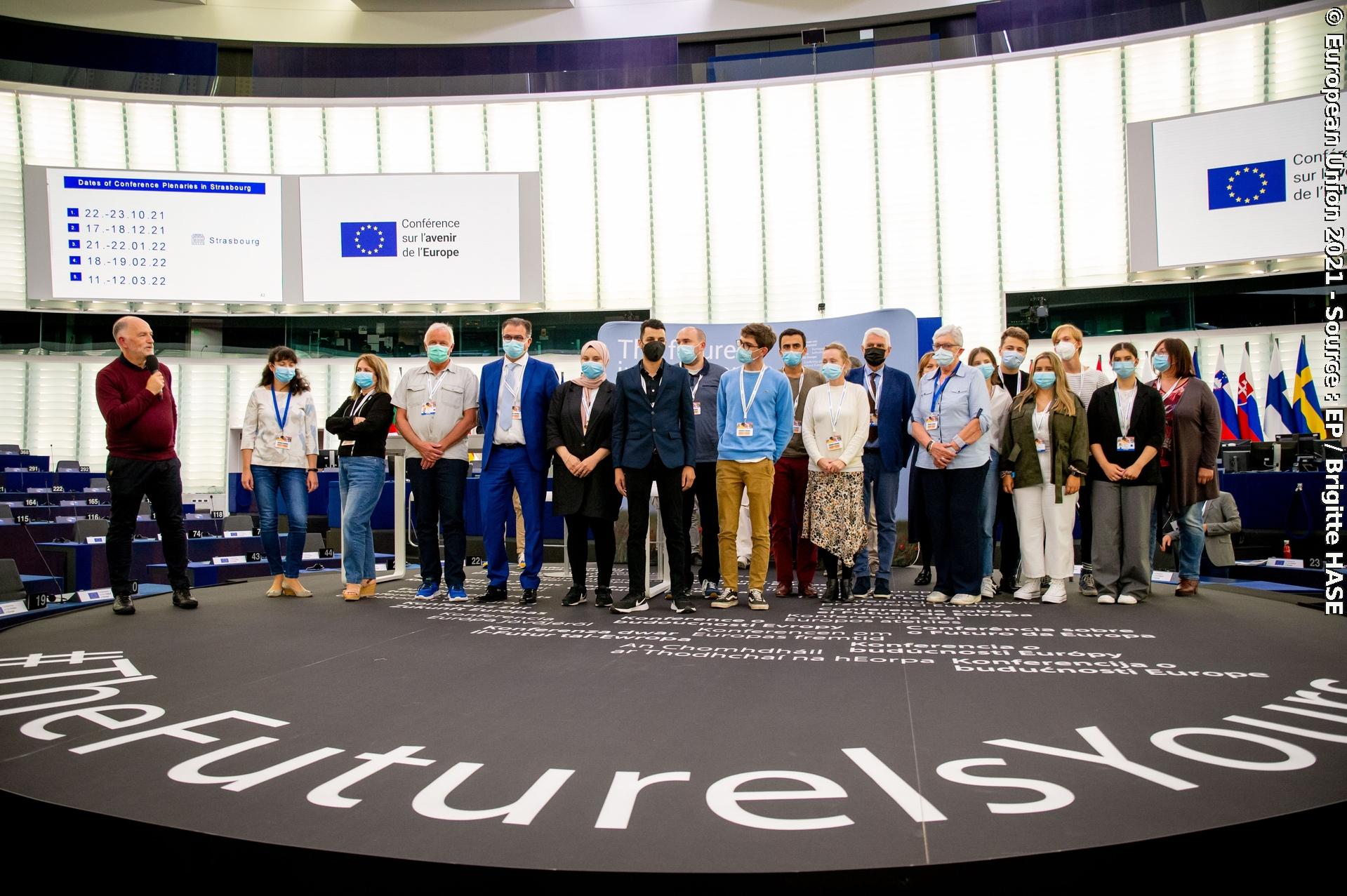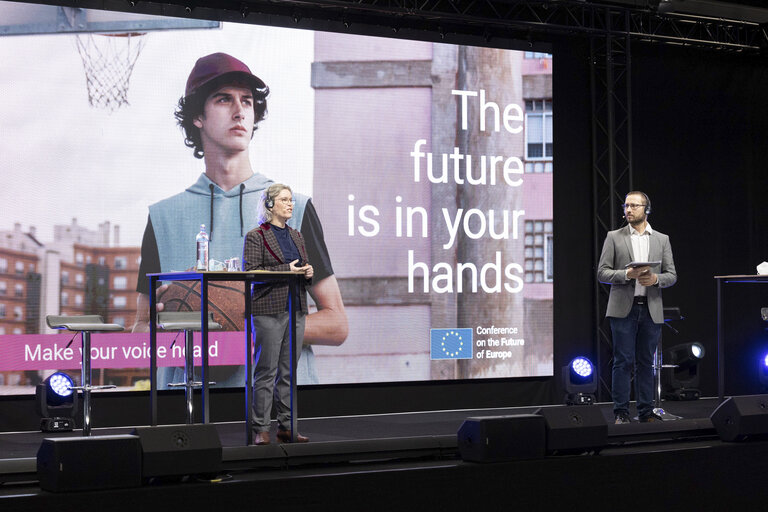CONTEXT AND OBJECTIVES
The Conference on the Future of Europe offered European citizens a unique opportunity to debate Europe’s priorities and the challenges it faces. The European Parliament, the Council and the European Commission are committed to listening to the citizens of Europe and to following up, within their spheres of competence, the recommendations made. The conference is placed under the authority of the three EU institutions, which are represented by the Presidents of the European Parliament, the Council and the European Commission, forming a joint Presidency. The Presidency was assisted by an Executive Board, co-chaired by the three EU institutions (Guy Verhofstadt, Member of the European Parliament, Clément Beaune, Secretary of State for European Affairs for the French Presidency of the Council and Dubravka Šuica, Vice-President of the European Commission responsible for Democracy and Demography).
A joint secretariat, limited in size and composed of officials equally representing the three institutions, assisted the Executive Board in its work.
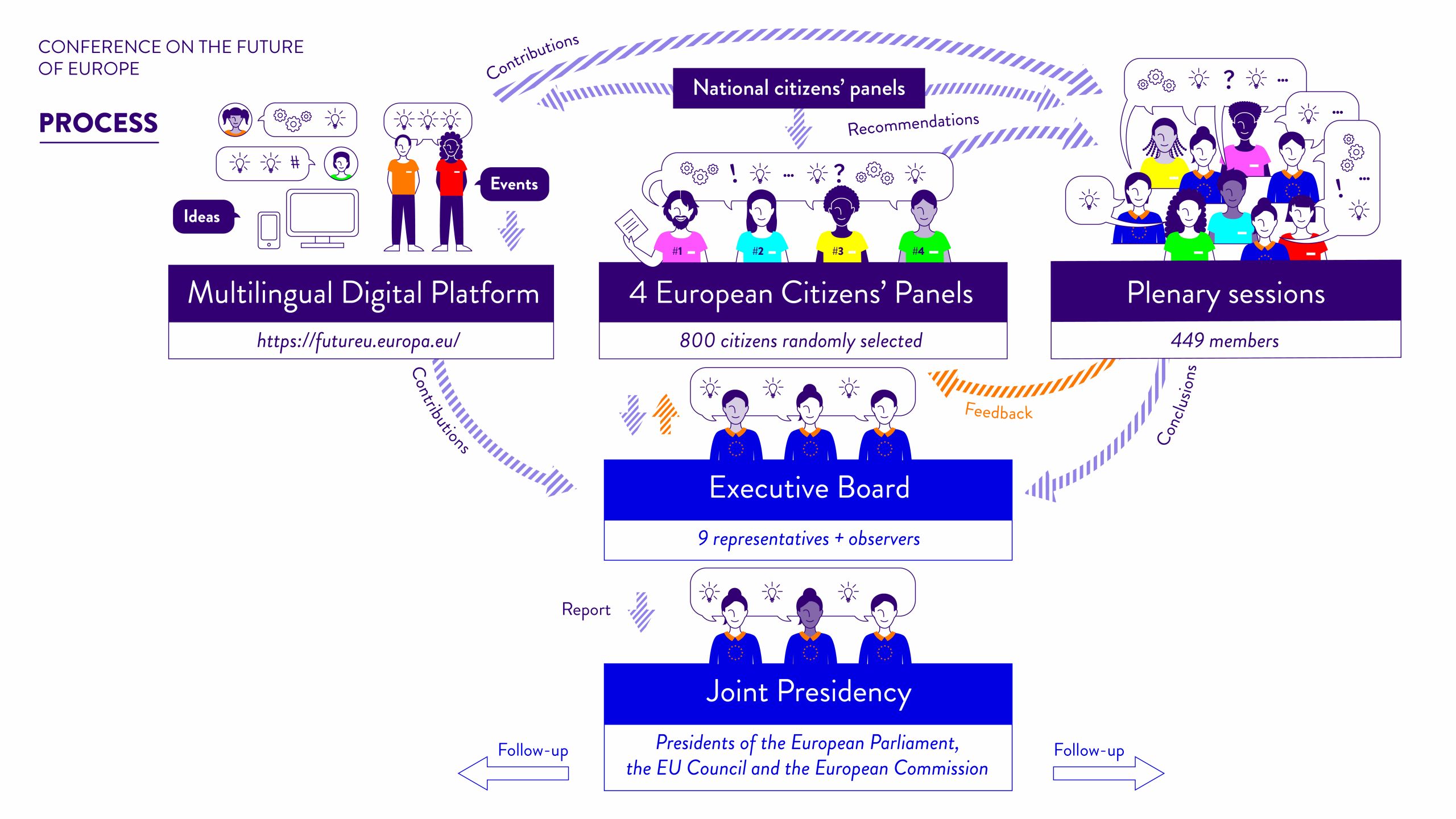
The Conference’s four key elements:
- A multilingual digital platform is the place where citizens can share their ideas and send in online contributions. These will be collected, analysed, monitored and published throughout the conference.
- decentralised events , online, hybrid or face-to-face, organised by citizens and organisations, as well as national, regional and local authorities, across Europe.
- panels of European citizens , who debate different themes and present their proposals. These panels are representative of the European population in terms of geographical origin, gender, age, socio-economic background and/or educational level.
- The plenary sessions , which ensures that the recommendations made by the national and European citizens’ panels, grouped by theme, are debated with no pre-determined outcome.
TERMS OF THE MISSION
The contractor, in close cooperation with the Commission, is asked to: Organise several (3-5) design workshops, involving in-house and external experts (identified by the EC), in order to refine the general concept of the panels and their interaction with the rest of the COFE as well as develop a consistent deliberative protocol. Identify the proper timeline and human resources needed, from both a logistical and an animation/ facilitation/interpretation point of view. Help prepare the supporting materials and documentation needed for the methodology as well as lists of experts and facilitators. Help to train the teams whether inside or outside the institutions, that could be involved in organising and accompanying the panels. Help to identify and contract the proper digital or onsite solutions that will allow a flexible approach to the organisation of the panels, depending on the methodology and the health conditions.
“People need to be at the very centre of all our policies. It is only together that we can build our Union of tomorrow.
Ursula von der Leyen
President of the European Commission
ADDED VALUE
The European Citizens’ Panels are a central element of the Conference on the Future of Europe. They brought together 800 citizens from all walks of life and regions of the European Union. At least one third of the participants in each panel were under 25 years old. From September 2021 to February 2022, the four panels, each made up of 200 citizens, met three times (Session 1 in Strasbourg and Session 2 in Brussels). three times (Session 1 in Strasbourg, at the European Parliament, Session 1 online, Session 3 in Florence, Warsaw, Maastricht and Dublin) to discuss, together, the following four main themes
Panel 1 – A stronger economy, social justice and jobs / education, culture, youth, sport / digital transformation
Panel 2 – European democracy / values and rights, rule of law, security
Panel 3 – Climate change, environment / health
Panel 4 – The EU in the world / migration
The Citizens’ Panels debated and made concrete recommendations on the future direction they want Europe to take. The participants of each panel
Recommendations from Panel 1
Recommendations from Panel 2
Recommendations from Panel 3
Recommendations from Panel 4
Citizen Panels are an unprecedented transnational and multilingual exercise in deliberative democracy, enabling European citizens to play a key role in shaping the future of the EU.
The recommendations of the Citizens’ Panels were then discussed at the sessions of the Conference Plenary. The Plenary was composed, on an equal footage, of 108 representatives of the European Parliament, 54 of the Council, 3 of the European Commission and 108 of the national parliaments, and 108 citizens: 80 representatives of the European Citizens’ Panels, 27 representatives (one per Member State) of the national Citizens’ Panels or of the events organised within the framework of the conference, as well as the President of the European Youth Forum. Also participating: 18 representatives of the Committee of the Regions and 18 of the Economic and Social Committee, 6 elected representatives from regional authorities and 6 elected representatives from local authorities, 12 representatives of the social partners and 8 from civil society.
The High Representative of the Union for Foreign Affairs and Security Policy is invited when the EU’s international role is discussed. Representatives of the main parties concerned may also be invited.
The meetings of the plenary assembly of the Conference are chaired by the three co-chairs of the Executive Board and are held in the premises of the European Parliament in Strasbourg.
The Plenary debated the recommendations presented by the national and European citizens’ panels, as well as the contributions published on the multilingual digital platform, grouped by themes, without a predetermined outcome.
The discussions were organised within 9 working groups based on the main themes of the Citizens’ Panels (A stronger economy, social justice and jobs / Education, culture, youth, sport / Digital transformation / European democracy / Values and rights, rule of law, security / Climate change and the environment / Health / The EU in the world / Migration). These debates allowed the members of each of the Plenary’s components to contribute to the discussions and to enrich the content, keeping the recommendations of the Citizens’ Panels as a basis. The working groups then drew up 49 proposals each one responding to an objective with a set of measures. These proposals were then submitted to the entire Plenary for consensus.
On 9 May 2022, for Europe’s Day, the European citizens, the members of the different components of the Conference Plenary, the co-presidents of the Executive Committee as well as the three presidents of the European institutions met in the European Parliament in Strasbourg.
The citizens presented the final report to Ursula von der Leyen, President of the European Commission, Roberta Metsola, President of the European Parliament and Emmanuel Macron, President of the French Republic on behalf of the French Presidency of the Council of the European Union.
In figures
In pictures
FOr more information, see our articles on the subject:
- “European citizenship is a matter of commitment” with Dubravka Šuica is Vice-President of the European Commission, responsible for Demography and Democracy. Read it here
- “EU and migration: understanding the cracks in our societies” with Giulia Scalettaris, lecturer in political science at the University of Lille, where she co-directs the Master in Humanitarian Action. Read it here
- “Democracy and European values: analysis of a CoFoE Citizens’ Panel with Olivier Costa (CNRS)” Read here
- “The Conference on the Future of Europe is a way to tackle the lack of intelligibility of the Union” with Alberto Alemanno, Professor of Law at HEC Paris and Jean Monnet Chair in European Union Law. Read it here
- “Conference on the future of Europe: towards a renewed European project with the citizens” to be read here
- Interview with Marie Caillaud, President of Young Europeans France: “Europe must take a step towards its citizens” read here
Find the joint declaration on the Conference on the Future of Europe here.
- The last Conference Plenary (29 and 30 April 2022)
- Closing Event on 9 May 2022
- Press conference of the three presidents of the European institutions





